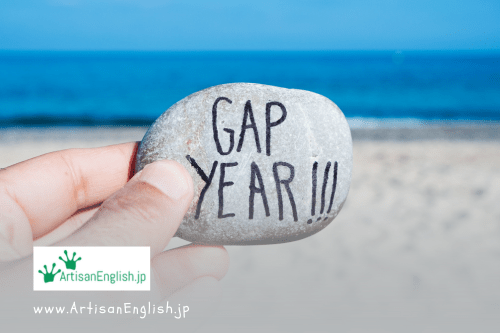
YouTube / iTunes / Spotify / Radio Public / Pocket Casts / Google Podcasts / Breaker / Overcast
Listen to ArtisanEnglish.jp posts & lesson intros here.
WotD: Gap year
A gap year is a period, usually a year, that students take off from their studies after high school before starting university or between the completion of their undergraduate degree and the beginning of graduate school.
The time is used for various activities like travelling, volunteering, or working.
The point of a gap year is to gain experience, learn new skills, and discover more about oneself and the world, and even to earn money for further studies.
Many students choose a gap year to explore different cultures and countries.
Travelling during a gap year has been an exciting way to see new places and meet new people.
The experience can enhance personal growth and confidence-building.
For those interested in community service, a gap year can include rewarding and meaningful volunteering opportunities.
A gap year is not just about travel.
Some students use this time to save money for their future studies.
Working during a gap year can provide financial support while also giving valuable work experience.
Employers often appreciate candidates who have taken a gap year, as it shows maturity and willingness to learn.
However, planning a gap year requires careful thought.
Students should consider what they want to achieve during this time.
Whether the goal is to see the world, learn a new skill, or gain work experience, having a clear plan can make the gap year more fruitful and not just a waste of a year.
A gap year allows students to step back from academics and focus on their interests and aspirations.
Whether travelling, volunteering, or working, a gap year can be a life-changing experience.
Taking this time can help students return to their studies with renewed energy and purpose.
Flesch-Kincaid Readability Test
This post is understandable by someone with at least a 9th-grade education (age 15).
On the Flesch-Kincaid reading-ease test, this post scores 57.
The easier a passage is to read, the higher the score on a scale of 0 – 100.

